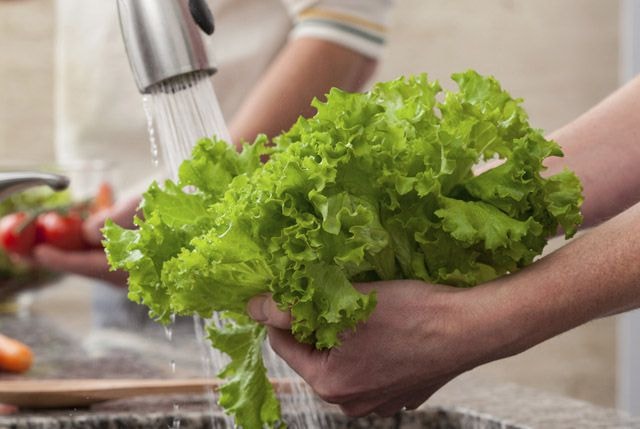Mistakes many people make when washing raw vegetables
Soaking raw vegetables in salt water for too long, or rinsing them and eating them right away... are mistakes many people make.
Raw vegetables are vegetables that can be eaten directly, without being processed. Vegetables that are often eaten raw include fish mint, Vietnamese balm, Vietnamese coriander, perilla, basil, lettuce, coriander, water mimosa, water spinach, water coconut...
Associate Professor, Dr. Nguyen Duy Thinh - Institute of Food Technology, Hanoi University of Science and Technology said that raw vegetables have a high risk of containing parasites because they are often watered with dirty water and fertilized with fresh manure. This is the seed that causes parasites to grow and spread such as worms, roundworms, liver flukes, etc. When larvae enter the body, they develop into worms. Eating raw vegetables also has the risk of other digestive diseases such as diarrhea, worm infection or dysentery.
According to experts, soaking vegetables in diluted salt water does not kill worms as many people think, the amount of chemicals on vegetables does not reduce significantly, the taste can be changed. On the contrary, soaking raw vegetables for too long (over 10 minutes) can cause loss of nutrients. You need to pick them clean and wash them many times with clean water, wash each leaf directly under running water to eliminate worm eggs, disease-causing bacteria and pesticide residues on vegetable leaves.
 |
It is better to wash each leaf directly under running water instead of soaking it all in a basin. |
If it is a large leafy vegetable like lettuce, break it into branches and leaves, turn them over to wash both sides, then put them in a basin and wash them normally once or twice. Some vegetables should be blanched in boiling water, at high temperatures, bacteria will die and will not harm the body.
After washing, raw vegetables need to be drained. Many people often shake them off and eat them right away, which can easily cause stomach aches for children or people with weak digestive systems.
Many people wash vegetables by soaking them in vinegar. Many studies show that vinegar helps kill bacteria, viruses, and break down pollen and hairs on the outside. A 10% vinegar mixture will reduce bacteria by up to 90%, but there is no research showing that vinegar completely removes pesticides. If you wash vegetables with vinegar, you should rinse them again with clean water.
Other vegetables such as cabbage, celery, and branched vegetables such as broccoli, cauliflower, etc. should be washed before cutting to ensure that the nutrients are not lost. If you cut them before washing, you will accidentally lose the necessary amount of vitamins.
When peeling or scraping off the outer layer of tubers such as potatoes, carrots, turnips, etc., germs, dirt, and pesticides on the surface can still penetrate deep inside. To clean, rinse thoroughly with cold water, avoiding rubbing vigorously so that the vegetables do not get crushed.

